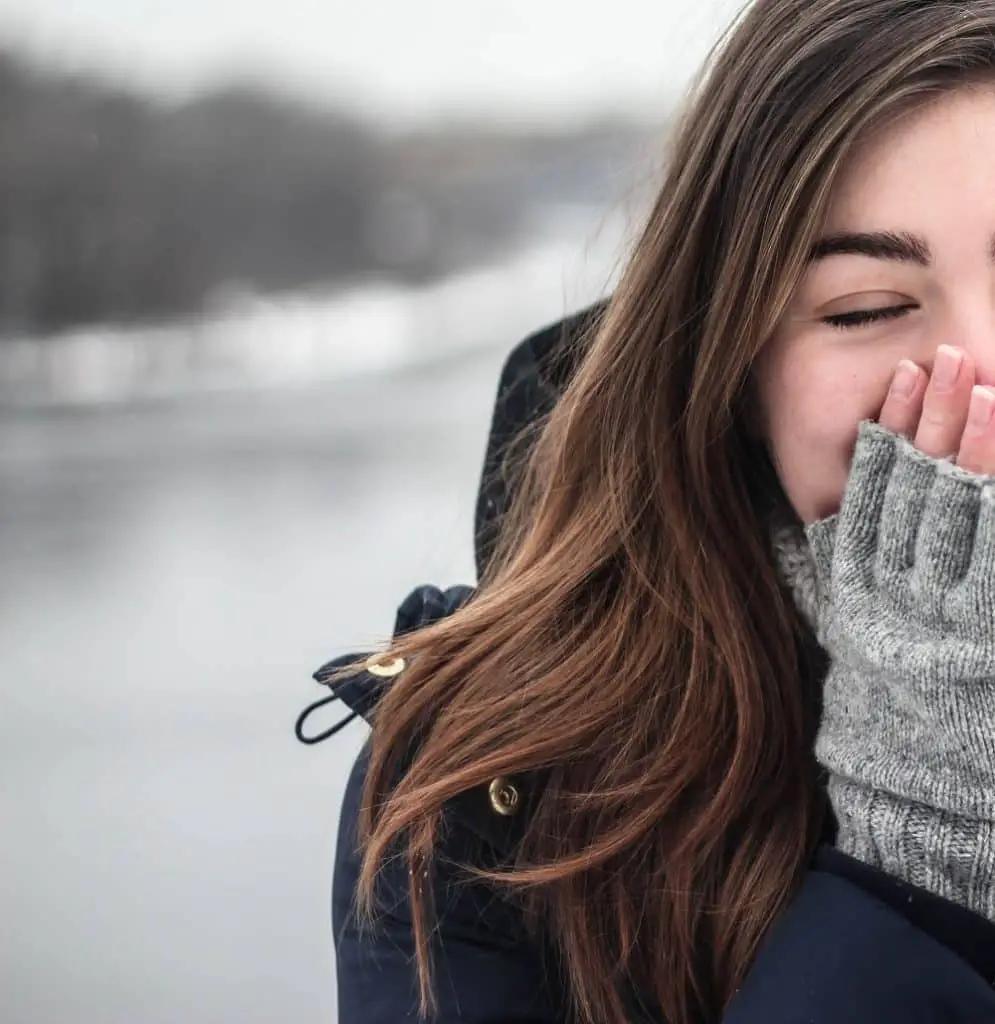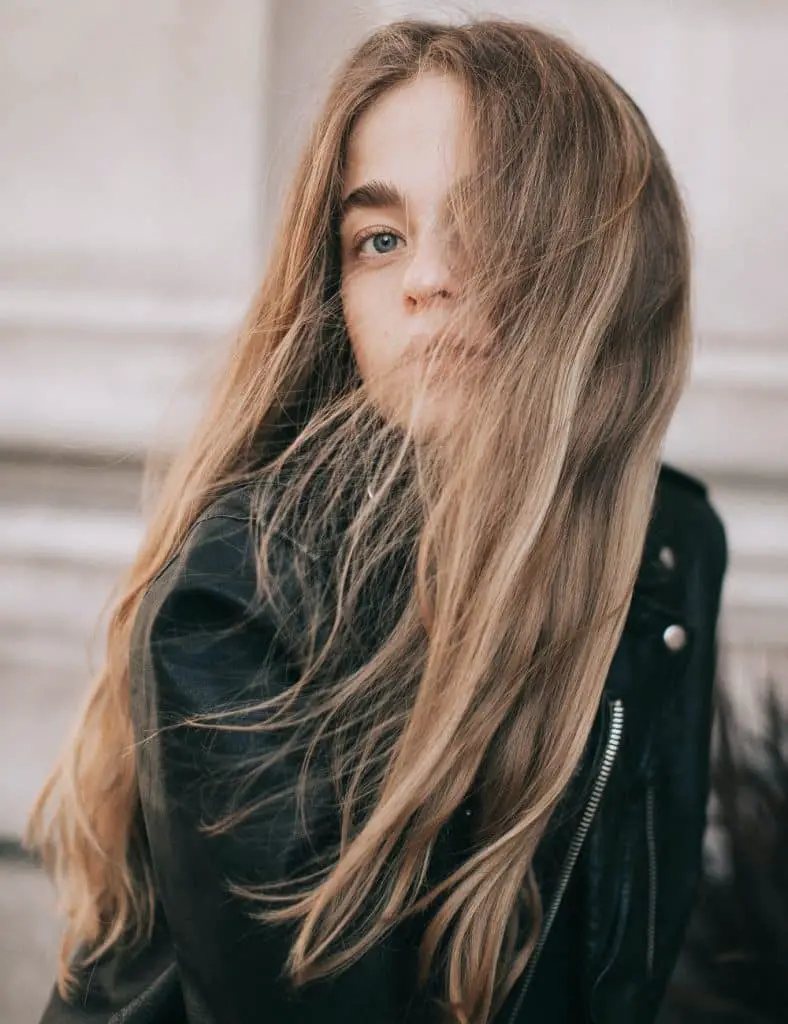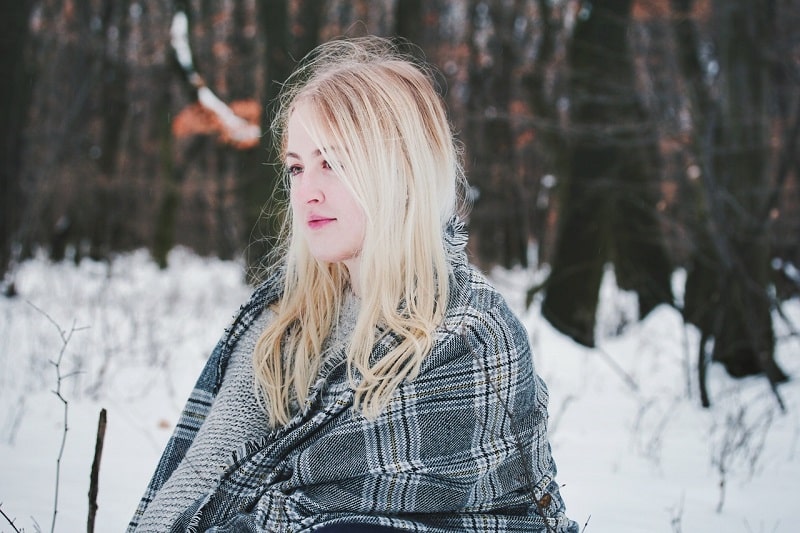Ugh! dry hair. Nobody wants that. But if that happens to you during the cold months, you’re not alone. Cold, freezing weather conditions can affect our hair in a not-so-pleasant way, unfortunately. It can cause static, tangles, brittleness, split ends, and even dandruff!
While those are all bad stuff, the good news is you can protect your hair from any harsh climate or winter conditions.
How to Protect Hair During Winter

1. Hydrate
Our hair does dry out during winter. Dullness and dryness are two of the initial effects of winter on our hair and scalp. It is because cold, winter air is humid. And therefore, it sucks up moisture in the air more quickly than warm air.
Hydration is slightly different from moisturization. When you hydrate your hair, you are basically “feeding” it with water AND essential nutrients from the inside out. Think about watering your plants.
So if you are wondering, “How can I hydrate my scalp in the winter?” The answer is water intake and nutrition.
Moisturizing hair means “sealing in” the water or moisture in your hair strands to keep it hydrated and full of life.
How to hydrate hair and scalp from within:
- Drink lots of water! (couldn’t emphasize this enough)
- Eat up more EFAs (essential fatty acids) [1]. Foods with EFAs help you fight brittleness and dryness. Want glossy hair? Ditch the chips and snack on healthy nuts more often.
- Add more healthy proteins to your diet. Keratin proteins are the building blocks of our hair. It only makes sense that we eat protein-rich food to boost hair strength and texture.
- Remember your vitamins. To have hydrated hair, we need vitamins such as antioxidants, iron, B vitamins, and vitamin A.
2. Humidify your room
Winter air is dry because of the low moisture level in the air. And we know that humidity doesn’t do any good to our hair.
Invest in a humidifier to help prevent dry winter hair.
To help amp up the effects of a humidifier on your hair, apply a natural bedtime hair mask to your hair once or twice a week. It helps lock in the moisture in your hair strands. Plus, it not only makes hair shinier, but it makes your scalp happy too.
3. Wash and rinse hair with cool water
Warm water can strip off your hair’s natural protection and moisture. It also opens up the pores in your scalp, leaving it prone to pollution and dandruff. Rinsing hair with cold water helps close pores and hair cuticles. Just wear a shower cap when taking warm showers.
4. Wash less frequently
With the above said, it’s best to wash our hair less often in the cold winter months. This is to avoid dryness and help retain natural moisture and oil in your hair as much as possible.
5. Don’t go outdoors with wet or unprotected hair
Wet hair is more vulnerable to harsh weather conditions. Go on and enjoy the outdoors in the wintertime but not when your hair is still wet. Also, wear satin-lined or silk-lined winter hats to prevent hair breakage and split ends.
6. Limit heat-styling
As much as possible, keep your hot tools hidden inside your drawer for now. If you have to style hair for an important event, make sure to heat-protect your hair.
7. Trim hair regularly
Regardless of the current season or weather, trimming our hair is an important part of a healthy hair regimen. During winter, it helps prevent breakage and split ends.
How do you fix dry hair in the winter?

If somehow you have not managed your dry winter hair quite perfectly, it isn’t too late to fix it.
Three things: hydration, hair care, and nutrition.
Well, regardless of the season we’re in, those three things are haircare essentials to keep in mind. Hair health starts from within. Even if we splurge on expensive hair products, they can only do so much in saving your hair. We should supplement external hair care with the right nutrition.
If we really want to breathe new life to dull, dry, and damaged hair, we should do the basics of skin and hair health: drink up more water, eat healthily, and use the right hair products.
Is it common to have hair fall in winter?

It’s safe to say that changing seasons affect our hair. We might shed more hair during the winter months. Normally we lose about 100 strands daily, so there’s really nothing to worry about as long as they’re replaced.
However, if you notice unusual hair thinning or see bald patches already, then it’s best to see your doctor. Check whether an underlying medical condition causes it.
If you think and feel that nothing is wrong, you can avoid hair loss and boost hair growth by doing the following steps:
- Avoid warm hair rinses – this opens up pores and triggers shedding.
- Avoid too much heat styling- if possible, airdry your hair.
- Use a brush or comb that helps prevent hair loss.
- Treat your hair and scalp to a weekly oil massage and treatment. Oils like virgin coconut oil, jojoba, and rosemary oil boost hair health and growth.
- Try supplementation. Seek your doctor’s advice for proper supplementation when needed. But nothing beats a natural, healthy diet.
In Conclusion
We all can weather through any storm, and so can our hair. Following the above tips, there is no reason not to survive and beat those harsh winter effects on our hair.
1. https://ods.od.nih.gov/factsheets/Omega3FattyAcids-Consumer/
- About the Author
- Latest Posts
Edith is a self-made entrepreneur with a keen business sense that others admire and a total “can-do” attitude. She’s always coming up with new ideas to anticipate her readers’ needs and help solve all their toughest beauty and skincare problems. You can find more about her Here.
FOLLOW HER on Linkedin and FACEBOOK and ThoseGraces Beauty Blog

